Backstage Merola, with Sunny and C.Y.
Merola Opera Program, now in full flight, is teeming with talent, as usual, and in a somewhat arbitrary way, I am picking just two of them to tell about. Tell, that is, through a helpful third party. Merolini are working 24/7, the protective Merola administration didn't like the idea of an Inquiring Reporter intruding, so publicists Karen Ames and Kristin Schellinger obtained the information from the singer.

Photos by Kristen Loken
"Sunny" is Sun Ha Yoon, an apprentice coach from South Korea. She is a fabulous accompanist, as audiences at Postcard from Morocco could see and hear for themselves.
"C.Y." is the Chinese tenor ChuanYue Wang, whose singing has made me gush, describing his "gorgeous tone, velvet-smooth legato, effortless elegance, a commanding presence in the voice, and great Italian diction." There is a special warmth in the voice of this young singer (28) with mature artistry. (Their real names are Yoon Sun Ha and Wang ChuanYue that is, if my name is Gereben János, but let that go.)
Wang is from Hei Long Jiang, in the northeastern part of China. The name means Black Dragon River, the Chinese name for the Amur. He is the product of the Central Conservatory of Music, where he studied with Ma Honghai and Zhang Liping (a soprano who starred as Cio-Cio-San with Covent Garden and the Metropolitan Opera). Wang's roles so far have included Alfredo (La traviata), The Steersman (Der fliegende Holländer), and Ernesto (Don Pasquale).
His favorite opera: Rigoletto. The Duke, of course, is one of the roles he wants in his repertory, in addition to Rodolfo, Alfredo, Edgardo, Nemorino. He already sung Ernesto in Shanghai.

Surprisingly, he has traveled a great deal outside China, to Japan, Italy, Spain, Germany, and the U.S. three times — the first time, after a successful Juilliard audition, he says, "they wanted me, but I wasn’t ready yet." A man firmly in charge of his career, "when I went to Vienna, I was 20 years old, and an agent tried to sign me, but I said no." It was after a New York audition for Merola that Wang accepted the offer from San Francisco. The music bug struck early:
In middle school, around age 16, I was in a play at school. The head of the theater program liked my work, and said "Your voice is very good," so I started to learn singing. I got a tape of Pavarotti and began to just imitate what he did. I did not know the meaning of the words, I just imitated. I never had an opera teacher because my village, it is very small.I did not begin to train in opera until I went to Beijing’s Central Music Conservatory. Before that, I just took singing lessons where I sung Italian art songs; there were no opera singers in my hometown. I did not receive professional classical music and opera lessons until my time at the Conservatory.
I come from a modest family with no musicians. My family owned a small shop and my father worked very hard. He was very very tough and strict on me, while my mother was gentle. In 2009, my father passed away. I am doing my best to support the family and I am always trying to prove to him that I can do it."
How is the Merola Program helping him?
In every way! Last week, I made a list and realized I have 15 teachers here and they all tell/teach me different things. Mark Morash helps me with voice, diction, and music. Sheri (Greenawald) has helped to give me direction, what I should be doing in the near future, what is good for me. Sheri is my "American mom," she teaches me the right placement and technique.Roy Rallo gave me every action/movement while he directed the Summer Schwabacher Concert. Giuseppe Finzi, being Italian, helped me with my Italian words and how to work with an orchestra. Cesar Ulloa is a very good voice teacher, he helped me with every note, every word. Sanford Sylvan has taught me good vocal technique.
Deborah Birnbaum helped me with my breathing, gestures, and posture. Artem Grishaev, my apprentice coach worked with me as I started Mefistofele from scratch. The reason these teachers are here is because they’re the best. I won’t ruin my voice, I am in good hands here. I am not worried because I have a whole group of people behind me.
Sun Ha Yoon is from Seoul, but she has extensive U.S. experience, having attended the University of Maryland and Juilliard. She was asked to explain what an apprentice coach does:
I coach and prepare the singers before they meet with the Merola coaches. I am not a singing coach, but we do practice basic skills such as pitch and diction, though — being Korean — I do not try to correct their English. I am specifically assigned four singers: Casey Candebat, Rose Sawvel, Aviva Fortunata, and Andrew Kroes. We work primarily on their individual repertory.
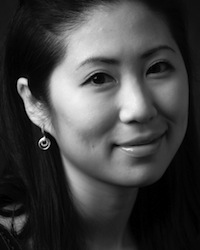
Why would an obviously excellent pianist choose this career?
From the beginning, I knew I was not interested in a solo piano career. I started playing for musicians in middle school and really enjoyed it. Eventually, I got my Master's in Korea in collaborative piano, and continued to study collaborative piano at Juilliard. At first, playing with vocalists was not my thing. It’s very competitive and I preferred working with instrumentalists. But in Maryland, I was asked to play for the opera, and I started working 20 hours a week with opera.In Korea, my teacher said to stick to chamber music, not to play with vocalists, because I was better at it. But I began to like playing for the opera and now this is what I want to do.
Unlike artists who want a career in an opera house, I want to work at a university with young singers. An opera house is different, and very competitive. My life plan was not to play with vocalists and to have a Korean boyfriend. My Korean friends would never have guessed that my life would take this turn — now I play for vocalists and have an American boyfriend.
His name is Daniel Walshaw, he lives in Maryland and D.C., wants to work for the Library of Congress. We have a long-distance relationship ever since I left Maryland to work in Los Angeles.
Besides L.A., and Santa Barbara, New York's Alice Tully Hall, the Peter Jay Sharp Theater, Weill Recital Hall at Carnegie Hall and Merkin Hall, Yoon traveled with the New Julliard Ensemble, performing at the Hungarian Music Festival, and elsewhere.
Of her experience with Postcard from Morocco, Yoon says:
I’ve come to love it. At first, I thought it to be quite an odd piece, didn't get the story and I didn’t really like the music. Then I heard it during an Argento festival and I heard something completely different, and fell in love with it, became very emotional during this music.Here at Merola, stage director Peter Kazaras has made it unbelievably creative. Some people may not like it at first, but there is a very emotional connection to the music and characters.
Of the Merola experience:
I instantly fell in love with San Francisco. It is so different from L.A., with so many different things I’ve never seen before, like hippies Haight-Ashbury. People warned me that San Francisco was going to be cold, so I was prepared and brought lots of stuff, I wear five layers of clothes, but I’m still cold. I see some people in shorts and flip flops, and I’m shocked that they can do this.Many years ago, I watched Mefistofole by the S.F. Opera on video and fell in love with Samuel Ramey. And then one day at the beginning of my time in Merola, I am in the elevator and there he was. At first I did not know it was him, because he had this huge costume, but when I realized it I was too shy to say anything. But it was a big moment for me, even though we did not talk; just to be in the same space with him was amazing.
Honoring 'The Founder' and Learning from Him

At 90, Robert Commanday — who with his wife, Mary, founded SFCV in 1998 — is not only in robust good health, but in his spare time delivers a nearly hourlong indepth lecture on the history and development of early music. That, at least, is what he did impressively on Saturday at the S.F. Conservatory of Music, as part of the American Bach Soloists Academy and Festival.
After the lecture, Commanday was celebrated in speeches by former SFCV Board Chair Thomas Watrous (who wished him a "great second half of a career"), SFCV Content Manager Michael Zwiebach, and San Francisco Opera Director of Communications and Public Affairs Jon Finck.
"For all the good that Bob Commanday did for the Bay Area music community," Zwiebach said, "by creating a place for good journalism that is accessible, informative, inclusive, and free, everything comes back to his 'old school' standards, which are now in the very DNA of everyone who works for SFCV.
Finck, who has worked with Commanday for many years, through thick and thin (both of which he specified in hilarious detail), and he recalled his constant rigor in ...
Holding a Board’s feet to the fire for allowing certain programming to go forward, was always mentioned ... or that the big three were not doing enough to incorporate local Bay Area composers, or reminding them of their basic leadership role as the stewards of the arts organization they served.Finck then used the critic's own words to describe him, quoting from Commanday's 1993 farewell article in The San Francisco Chronicle:
I don’t regret or withdraw a single carping article or castigating review. The standards I had held to were not set by me, but by the works and the art form first, and then by the artists and performing institution themselves. They also are measured by what we have come to expect of them and what they claim and aim to be.In that sense, evaluating is an act of respect. A symphony, opera, or ballet company can’t aspire to be "world class" (a ridiculous term in any event) and profess it in the publicity and then feel it should not be judged on those terms.
If we’re tough, it’s because we care, which serves as the same basis for our enthusiasm and praise. It’s the caring we share, not any particular opinions. Agreeing isn’t what matters.
The best reward has been the sense I’ve gotten that you readers get that point. That’s why ours is such a great audience and why it must inspire the performers.
House of Usher No Longer Nevermore
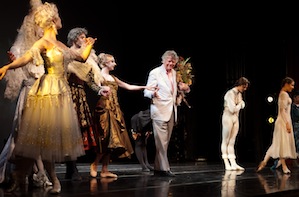
Photo by Moanalani Jeffrey
Most of us have lived our lives only tangentially — if at all — intersecting with Edgar Allan Poe’s The Fall of the House of Usher, notwithstanding its haunting opening line: "During the whole of a dull, dark, and soundless day in the autumn of the year, when the clouds hung oppressively low in the heavens, I had been passing alone, on horseback, through a singularly dreary tract of country ..."
But now, Gordon Getty's ballet set on the story is going around the world, including Napa's Festival del Sole, and ever-adventurous Long Beach Opera is preparing to produce Philip Glass' work based on "the gothic horror story which blurs the line between the real world and the supernatural ... [his] haunting and suspenseful music provides the soundscape for this journey to the edge of madness."
Long Beach Opera knows from madness, with its bold, no-warhorse programming year after year, experimenting, risking ... and succeeding. This is the company's 2013 season:
- Glass, The Fall of the House of Usher; Jan. 27, Feb. 2, 3.
- Gabriela Ortiz, Unicamente la Verdad; March 24, 30. "Only the Truth," about Camelia "La Tejana," the subject of three corridos popularized by the famous band Los Tigres del Norte. Unlike women in other corridos, Camelia had dared to kill one Emilio Varela, the lover who betrayed her after they smuggled some weed over the border together.
- Stewart Copeland, Tell-Tale Heart and Michael Gordon, Van Gogh; May 11, 18 (matinee and evening), 19.
- Ernest Bloch, Macbeth; June 15, 22, 23.
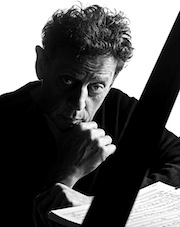 Copeland, who is the drummer for The Police, says: "The central figure is a man who is both horribly sane and completely maaaaad, which is always good for bit of singing. For a composer, opera is the ultimate. Writing pop songs is fun. You can stretch them into a concept album, but you’re still basically limited to guitar, bass and drums. I’ve done a lot of film music, which lets you play with the orchestra, but finally the director is in the driving seat. But, in opera, the composer is God. And I like playing God. What’s difficult is coming up with something that will transcend the expectations set up by the idea of a rock musician writing an opera. I’m hoping The Tell-Tale Heart won’t sound either classically operatic or rock in idiom."
Copeland, who is the drummer for The Police, says: "The central figure is a man who is both horribly sane and completely maaaaad, which is always good for bit of singing. For a composer, opera is the ultimate. Writing pop songs is fun. You can stretch them into a concept album, but you’re still basically limited to guitar, bass and drums. I’ve done a lot of film music, which lets you play with the orchestra, but finally the director is in the driving seat. But, in opera, the composer is God. And I like playing God. What’s difficult is coming up with something that will transcend the expectations set up by the idea of a rock musician writing an opera. I’m hoping The Tell-Tale Heart won’t sound either classically operatic or rock in idiom."
Gordon, the co-founder of Bang on a Can, started writing Van Gogh "because of my obsession with the letters Vincent Van Gogh wrote to his brother Theo. I assembled the texts myself, drawing from these letters, in many cases combining lines from different letters or from different places within the same letter. What attracted me so much to Van Gogh’s writing was the pain, rawness and brutal honesty. I found it hard to believe that anyone could tell another person, even his brother, the raw emotions that Van Gogh experienced — so painful, lonely and humiliating."
Composed a century ago, Bloch’s opera reveals the influence of Wagner's music dramas and Debussy's Pelleas et Melisande. Macbeth premiered in the Opéra-Comique Paris, then staged in 1938 in Naples, but was then banned on orders of the Fascist government. Subsequently, it was produced in Rome and Trieste. The opera had only one production in the U.S., in English, at the Juilliard School, in 1973.
'Geisha Music' Celebration
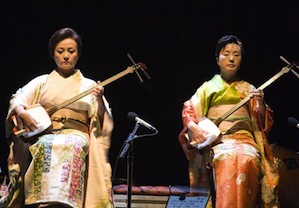
Shamisen (Japanese lute) master Tatsu Aoki is joining Chizuru Kineya (shamisen), Melody Takata (taiko — Japanese drums), Francis Wong (saxophone), and Yangqin Zhao (Chinese hammered dulcimer) in a free concert on July 29 in Tateuchi Auditorium, 1830 Sutter Street. It is co-produced by Asian Improv aRts, GenRyu Arts, and Nihonmachi Little Friends.
Aoki's Toyoakimoto, a reconstruction of Tokyo-style geisha music, is also being issued on a CD. Toyoakimoto is a geisha house in downtown Tokyo where Aoki was born and grew up. The origins of the house and its arts date back to the Edo period, which began with the ascendancy of the Tokugawa Shogunate in 1603.
Within this house, the ozashiki (teahouse) shamisen music that Aoki has reconstructed was mainly instrumental and used mostly as interlude music before the featured geisha ladies appear. For Aoki, known both for his achievements as an experimentalist in music and film as well as in the traditional Japanese cultural arts, this legacy is at the center of everything he has done as an artist. Says Aoki:
One of my most important goals is to preserve the original essence of fluidity and flexibility, and to perform the rawness of real sound. I always apply this idea to everything I do. From my childhood environment, I inherited the historical and traditional essence of the Tokyo entertainment district’s musical concepts, and the fundamentals and value of flexible creations and applications.With the decline of these special districts in the late 60s and early 70s, the musical concepts of Tokyo’s regional entertainment also faded away, along with many other art forms that Tokyo geisha music had institutionalized. I wanted to recreate the lost spirit and reconstruct this wonderful music.
Steinberg's 'How I Fell in Love with Music'
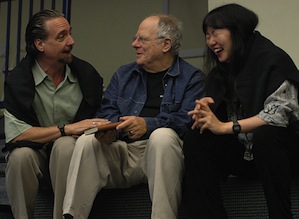
I fell in love with music in a murky alley when I was eleven. Sometimes I ask friends when and where and how it happened to them, and they recount childhood memories of hearing a beautiful cousin play a Chopin etude, of being stunned by a broadcast of the Saint Matthew Passion, or sent into reveries lying under the family piano while Mother practiced Songs without Words. My own fall was less romantic.More precisely, I was seduced and then proceeded to fall in love. It was Fantasia, the original 1940 version, that did me in. I saw it just once, at the Cosmopolitan, a dingy movie house in Cambridge, England, and although this was more than 65 years ago, I remember it more vividly than most of the movies seen in the last 65 weeks.
I saw it just once because as a schoolboy on threepence a week in pocket money — even in 1940 that bought hardly anything, and surely not more than half a movie ticket — I couldn’t afford to go again. Besides the guardians of Good Taste would not have encouraged, let alone subsidized, a return visit. But I also realized I did not need to see it again because the most important part was available for free.
Behind the sweet little fleabag where Fantasia was playing, there was this alley where I could stand every day after school, stand undisturbed, and listen to the soundtrack of Leopold Stokowski and the Philadelphia Orchestra playing Bach, Beethoven, Schubert, and Stravinsky. On a recent visit to Cambridge l was happy to see there is still a movie theater on the same site, but it is now called the Arts Theatre and is a lot cleaner.
UC Davis' Globe-Trotting Conductor

To reach UC Davis Symphony Music Director Christian Baldini for comment about his appointment last week as music director of Sacramento's Camellia Symphony, Google searches and emails led to Buenos Aires.
Once located, the 33-year-old conductor of Argentine-Italian descent explained why he is in Buenos Aires and talked about his future plans:
I am adding this new position to my current one, and will still reside in Davis. I am the proud father of two little boys (aged nearly 2 and nearly 4), and Davis seems like a really wonderful place for them to grow up in.I am right now in Buenos Aires, guest conducting the Philharmonic here (the Teatro Colon orchestra), and having the honor of taking this orchestra for the first time to a brand new venue! There is an article about the concert.
Berlioz Requiem and Other Massive Choral Works in Davies Hall
Combined forces from the Finger Lakes (New York) Choral Festival, directed by Adrian Horn; the Rochester (New York) Oratorio Society, directed by Eric Townell; the San Francisco Lyric Chorus, directed by Robert Gurney, and Redwood Symphony (including four brass choirs), conducted by Eric Kujawsky will support a huge chorus, consisting of 70 singers from the New York groups, and 140 singers drawn from 35 San Francisco Bay Area choruses, at 3 p.m. Aug. 5, in Davies Symphony Hall.
In addition to the Requiem, featuring tenor Dan McInerney, the program includes Mendelssohn's Hebrides Overture, Berlioz' "Shepherd's Farewell" from L'Enfance du Christ, the Fanfare Introduction from Strauss' Also Sprach Zarathustra, and the final chorus from Boito's Mefistofele.
The (Many) Tales of Hoffmann, Chapter 1
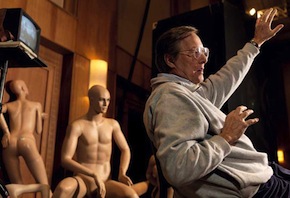
Offenbach's The Tales of Hoffmann is both beloved and controversial. Audiences love it; musicians, musicologists, and those responsible for producing it have an ongoing debate about how to present it, in what order, with or without dialogue, and so on.
Now that San Francisco is getting both a Pocket Opera production now, and a San Francisco Opera version next summer, it is timely to attempt a "Hoffmann-101," just to open the conversation.
Let Pocket Opera's Donald Pippin have the first word:
After charming the musical world for several decades with such delights as Orpheus in the Underworld, La Vie Parisienne, La belle Hélène, and dozens of other sparkling, light-hearted operettas, most of which were hugely successful in their day, Offenbach felt that this was not enough to assure his rightful place in the opera halls of fame.He needed something more substantial, more powerful — a full-scale opera. The idea germinated in his fertile brain for at least 20 years, and ultimately gave birth to The Tales of Hoffmann, a miracle that greatly surpassed even the most optimistic expectations. Losing none of the verve and vitality, the tunefulness for which he is justly famous, this went much further into deeper realms. A triumph! A Mt. Everest!
Despite its huge popularity, even today the opera is seldom performed the way Offenbach intended, a practice that Pocket Opera is happy to correct. He wanted most of the dialogue to be spoken rather than sung. Because spoken words tend to move faster than sung words, this obviously quickens the pace. It also lightens the texture, and offers much by way of contrast and relief.
The over-ripe orchestrated recitatives were composed and tacked on by someone else after Offenbach’s death. They may be appropriate for the huge opera houses, but the too-consistent heaviness radically changes and bogs down the overall effect. I’m pretty sure that Offenbach would have preferred the taut, leaner, livelier approach. Come and find out for yourself! Share the exhilaration and wonder.
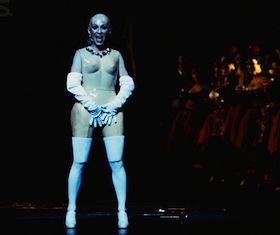
Photo by Robbie Jack
I have always been a fan of Donald Pippin and Pocket Opera. Over the years, many have purported to be able to present Les contes d'Hoffmann "the way Offenbach intended." It's not just a matter of collating the first edition of the libretto with the first edition piano-vocal score from the first performance at the Opéra-Comique, where spoken dialogue was mandated for works performed there.Offenbach composed many of the recitative passages in the opera, which originally he did not want to be performed with spoken dialogue. When the decision was made to present the first performance at the Opéra-Comique, it was a given that spoken dialogues would be used.
Having spent more than 25 years establishing the landmark edition of the opera, now a co-editon with Jean-Christophe Keck, for a consortium of three publishers (Schott Musik, Boosey&Hawkes and Bote&Bock), we have unequivocally established exactly what Offenbach delivered to the Opéra-Comique and what was subsequently done to it by others, including Leon Carvalho (director of that theater), Ernest Guiraud, Auguste Bazille, Jules Danbé (the first person to conduct the opera), Albert Carré, Raoul Gunsbourg, André Bloch, and Pierre Barbier (son of the librettist of the opera, Jules Barbier).
There is no longer any doubt about what Offenbach actually wrote for the first four acts of the opera and the surviving manuscripts contain a rich assortment of authentic possibilites for ending the opera, the last act of which remains the most complicated in terms of deciding on a performing edition. Any opera company using multiple singers for the heroines, is certainly not what Offenbach intended. Any production using a mezzo-soprano for Giulietta is also not on the right track.
There still are several unknown facets and jewels to be revealed in connection with the genesis and history of Offenbach's masterpiece. I hope we will be able to do that in interesting ways for the first time in San Francisco to celebrate the San Francisco Opera's new production of the opera next season.

